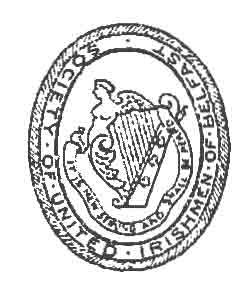James Orr, Napoleon and Lord Nelson
Author: Carol Baranuik
Date: 2010
Source: Ullans: The Magazine for Ulster-Scots, Nummer 11 Ware 2010
Carol Baranuik

The Society wishes to congratulate Carol, who is a long-standing member and is also on the USLS Committee, on her graduation with a PhD from Glasgow University during the summer of last year. The subject of her thesis was James Orr.
James Orr, the renowned Bard of Ballycarry, supported the United Irishmen’s attempt in 1798 to achieve greater democracy for all Ireland’s citizens, but as an honest opponent of tyranny wherever he found it, he could not share the hopes of some of his compatriots who imagined Napoleon Bonaparte as a potential saviour of Ireland in the post Act of Union era.
Orr achieved his status as a local bard by chronicling significant community events and by recording, reflecting on and interpreting national and international news for the enlightenment of his neighbours. That he kept a close eye on the conflicts of the Napoleonic period is clear from two poems published in The Belfast Commercial Chronicle in late 1805, around the time of Nelson’s victory and death at Trafalgar. The first is ‘Soliloquy of Bonaparte’, printed on October 14. The piece is a dramatic monologue which imagines the newly crowned Emperor feeling dissatisfied with ‘vict’ry, honour and a tott’ring throne’. Orr portrays him as tormented by inner guilt, brought about by the sacrifice of his ideals:
How does promotion change the patriot’s mind!
He scorns the people whom before he freed:—
Supreme command has seldom been resign’d
By prideful chiefs, who private stations dread. (ll. 9-12)
As Napoleon’s meditations continue, his thoughts turn to the fawning toadies who flatter him with comparisons to Caesar, but this only serves to remind him of how Caesar was betrayed: ‘Caesar’s grim ghost, by night, disturbs my rest, / Shows his rent robe, and says — “Thy fortune see!”’ (11. 25-6). The last lines vividly imagine his anxiety for the future and his inner turmoil:
Curs’d be ambition! Why have I aspir’d?
Alas! I dream’d not, when my sphere was small,
That on the pinnacle I so admir’d,
I’d mark the dire descent, and thus forbode my fall!
Still more interesting is a further dramatic monologue titled ‘Lord Nelson’s Song of Victory’, which is not included in any edition of Orr’s work. This piece appeared in the Belfast Commercial Chronicle, in November, 1805 and was signed ‘J.O., Ballycarry’. Following closely on Nelson’s defeat of Napoleon, it was probably intended as a companion piece to be read alongside the ‘Soliloquy’, highlighting the differences of attitude and temperament between the British commander and his French counterpart. The poem’s focus is the comfort experienced by the dying Nelson as he thinks about the success his daring naval action has achieved. The last line of each verse repeats the refrain that ‘Vict’ry consoles me in death’, surely a deliberate play on the name of the great Admiral’s vessel. This is, however, no blind patriotic rant. The ugliness of war and the suffering inflicted on both friend and enemy are very apparent:
Broadside follows broadside, all fatal, how fast
The French from their masts fall! The masts fall at last —
In the shrowds hang the dying, whose limbs lie beneath.
Nelson adds a humanitarian plea to the conquerors to save the sufferers, whatever their nationality.
Previously, in one of his greatest Braid Scotch poems, ‘Donegore Hill’, Orr had castigated those of his United Irish comrades at the Battle of Antrim who fled the scene, leaving their brothers-in-arms to bear the brunt of state fury expressed with ‘the nine-tailed cat and choakin’ rape’. Orr’s admiration for the British commander at Trafalgar seems rooted in the fact that he stayed at his post and died courageously. It may also be related to the fact that in 1802 Nelson had appeared as a character witness at the trial for treason of Colonel Edward Marcus Despard.
Despard, an Anglo-Irishman, was a member of the reformist London Corresponding Society and had links with the Society of United Irishmen which he may also have joined, although the charges at his trial related to other matters. In addition Despard had married a black woman and was friendly to the abolitionist cause, strongly supported by radicals such as Orr. Nelson’s intervention at the trial was insufficient to save Despard from hanging and decapitation, but as a result of it he was spared the torture of disembowelment.
No doubt James Orr had friends and neighbours with sons or husbands serving aboard the British fleet in 1805. In honouring Nelson, Orr honoured all the men whose steadfastness and self-sacrifice brought about his famous victory.

